Ditapis dengan
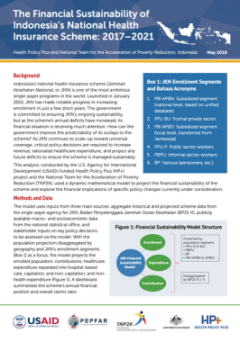
The Financial Sustainability of Indonesia’s National Health Insurance Schem…
Indonesia continues to make considerable progress to increase the membership of its social insurance program especially for its wage recipients (pekerja penerima upah/PU) who are mostly formal sectors workers. Unfortunately, coverage for the non-wage recipients/pekerja bukan penerima upah/BPU who mostly work at the informal sector workers are still very low (about 2.4 million active members as …
- Edisi
- 1
- ISBN/ISSN
- -
- Deskripsi Fisik
- PDF, 3 Halaman
- Judul Seri
- Policy Brief
- No. Panggil
- 368.4 TNP.T
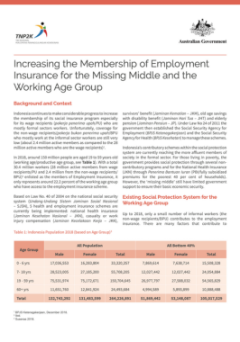
Increasing the Membership of Employment Insurance for the Missing Middle and …
Indonesia continues to make considerable progress to increase the membership of its social insurance program especially for its wage recipients (pekerja penerima upah/PU) who are mostly formal sectors workers. Unfortunately, coverage for the non-wage recipients/pekerja bukan penerima upah/BPU who mostly work at the informal sector workers are still very low (about 2.4 million active members as …
- Edisi
- 1
- ISBN/ISSN
- -
- Deskripsi Fisik
- PDF, 2 Halaman
- Judul Seri
- Policy Brief
- No. Panggil
- 368.4 LAR.I
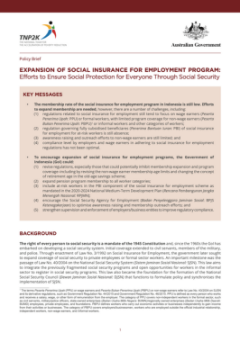
Policy Brief: Expansion Of Social Insurance For Employment Program: Efforts …
The right of every person to social security is a mandate of the 1945 Constitution and, since the 1960s the GoI has embarked on developing a social security system. Initial coverage extended to civil servants, members of the military, and police. Through enactment of Law No. 3/1992 on Social Insurance for Employment, the government later sought to expand coverage of social security to privat…
- Edisi
- -
- ISBN/ISSN
- -
- Deskripsi Fisik
- PDF, 12 Halaman
- Judul Seri
- Policy Brief
- No. Panggil
- 368.4 MIL.E
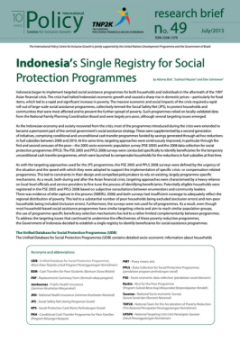
Indonesia’s Single Registry for Social Protection Programmes
Indonesia began to implement targeted social assistance programmes for both households and individuals in the aftermath of the 1997 Asian financial crisis. The crisis had halted Indonesia’s economic growth and caused a sharp rise in domestic prices—particularly for food items, which led to a rapid and significant increase in poverty. The massive economic and social impacts of the crisis r…
- Edisi
- 1
- ISBN/ISSN
- -
- Deskripsi Fisik
- PDF, 6 Halaman
- Judul Seri
- Policy Brief
- No. Panggil
- 368.4 BAH.I
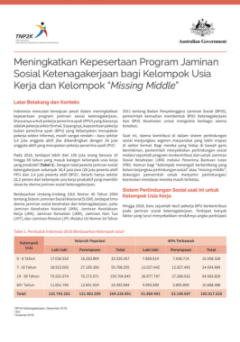
Meningkatkan Kepesertaan Program Jaminan Sosial Ketenagakerjaan bagi Kelompok…
Indonesia mencatat kemajuan pesat dalam meningkatkan kepesertaan program jaminan sosial ketenagakerjaan, khususnya untuk pekerja penerima upah (PPU) yang biasanya adalah pekerja sektor formal. Sayangnya, kepesertaan pekerja bukan penerima upah (BPU) yang kebanyakan merupakan pekerja sektor informal, masih sangat rendah— baru sekitar 2,4 juta anggota aktif jika dibandingkan dengan 28 juta angg…
- Edisi
- 1
- ISBN/ISSN
- -
- Deskripsi Fisik
- PDF, 2 Halaman
- Judul Seri
- Policy Brief
- No. Panggil
- 368.4 LAR.M
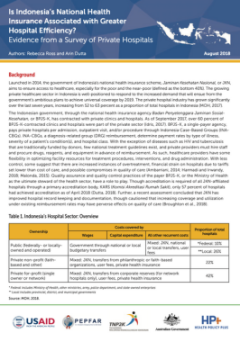
Is Indonesia’s National Health Insurance Associated with Greater Hospital …
Launched in 2014, the government of Indonesia’s national health insurance scheme, Jaminan Kesehatan Nasional, or JKN, aims to ensure access to healthcare, especially for the poor and the near-poor (defined as the bottom 40%). The growing private healthcare sector in Indonesia is well-positioned to respond to the increased demand that will ensue from the government’s ambitious plans to ac…
- Edisi
- 1
- ISBN/ISSN
- -
- Deskripsi Fisik
- PDF, 7 Halaman
- Judul Seri
- Policy Brief
- No. Panggil
- 368.3 TNP.I
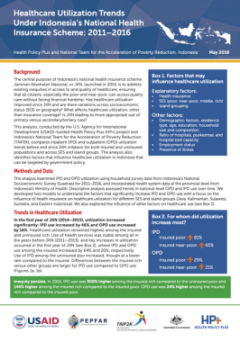
Healthcare Utilization Trends Under Indonesia’s National Health Insurance S…
The central purpose of Indonesia’s national health insurance scheme Jaminan Kesehatan Nasional, or JKN, launched in 2014, is to address existing inequities in access to and quality of healthcare, ensuring that all citizens, especially the poor and near-poor, can access quality care without facing financial hardship. Has healthcare utilization improved since JKN and are there variations across…
- Edisi
- 1
- ISBN/ISSN
- -
- Deskripsi Fisik
- PDF, 2 Halaman
- Judul Seri
- Policy Brief
- No. Panggil
- 368.3 TNP.H
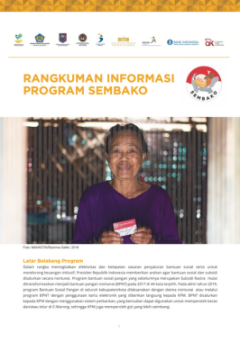
Rangkuman Informasi Program Sembako
Dalam rangka meningkatkan efektivitas dan ketepatan sasaran penyaluran bantuan sosial serta untuk mendorong keuangan inklusif, Presiden Republik Indonesia memberikan arahan agar bantuan sosial dan subsidi disalurkan secara nontunai. Program bantuan sosial pangan yang sebelumnya merupakan Subsidi Rastra mulai ditransformasikan menjadi bantuan pangan nontunai (BPNT) pada 2017 di 44 kota terpil…
- Edisi
- 1
- ISBN/ISSN
- -
- Deskripsi Fisik
- PDF, 8 Halaman
- Judul Seri
- Policy Brief
- No. Panggil
- 363.8 TIM.R
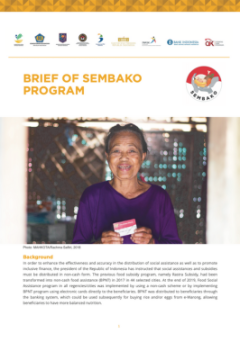
Brief Of Sembako Program
In order to enhance the effectiveness and accuracy in the distribution of social assistance as well as to promote inclusive finance, the president of the Republic of Indonesia has instructed that social assistances and subsidies must be distributed in non-cash form. The previous food subsidy program, namely Rastra Subsidy, had been transformed into non-cash food assistance (BPNT) in 2017 in 44 …
- Edisi
- 1
- ISBN/ISSN
- -
- Deskripsi Fisik
- PDF, 8 Halaman
- Judul Seri
- Policy Brief
- No. Panggil
- 363.8 TIM.B
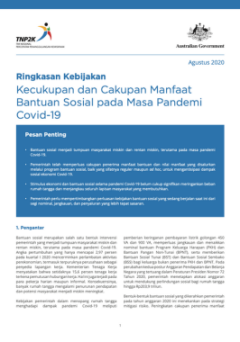
Ringkasan Kebijakan Kecukupan dan Cakupan Manfaat Bantuan Sosial pada Masa Pa…
Bantuan sosial merupakan salah satu bentuk intervensi pemerintah yang menjadi tumpuan masyarakat miskin dan rentan miskin, terutama pada masa pandemi Covid-19. Angka pertumbuhan yang hanya mencapai 2,97 persen pada kuartal I 2020 mencerminkan perlambatan aktivitas perekonomian, termasuk terpuruknya perusahaan sebagai penyedia lapangan kerja. Kementerian Tenaga Kerja menyatakan bahwa setidaknya …
- Edisi
- 1
- ISBN/ISSN
- -
- Deskripsi Fisik
- PDF, 12 Halaman
- Judul Seri
- Policy Brief
- No. Panggil
- 363.8 ASM.R
 Karya Umum
Karya Umum  Filsafat
Filsafat  Agama
Agama  Ilmu-ilmu Sosial
Ilmu-ilmu Sosial  Bahasa
Bahasa  Ilmu-ilmu Murni
Ilmu-ilmu Murni  Ilmu-ilmu Terapan
Ilmu-ilmu Terapan  Kesenian, Hiburan, dan Olahraga
Kesenian, Hiburan, dan Olahraga  Kesusastraan
Kesusastraan  Geografi dan Sejarah
Geografi dan Sejarah